June 8, 2025 | 23:56 GMT +7
June 8, 2025 | 23:56 GMT +7
Hotline: 0913.378.918
June 8, 2025 | 23:56 GMT +7
Hotline: 0913.378.918
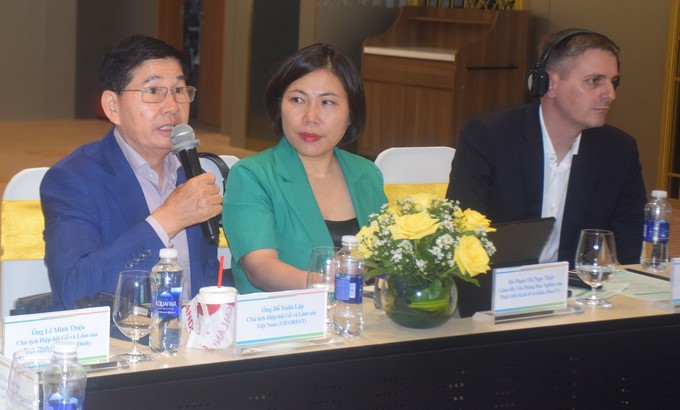
Mr. Do Xuan Lap, Chairman of VIFOREST (far left), and Mr. Philip Graovac, Deputy Country Representative of Asia Foundation in Vietnam (far right), at the workshop on the green transformation of the wood industry. Photo: V.D.T.
According to Mr. Do Xuan Lap, Chairman of the Vietnam Timber and Forest Product Association (VIFOREST), production with greenhouse gas (GHG) emission reduction and "greening" the supply chain of the wood industry are now urgent tasks to keep up with the trend of the times. Starting in 2025, Vietnam will establish and organize a pilot operation, and in 2028, it will officially operate a carbon exchange.
Right now, wood enterprises, especially wood processing enterprises, must have orientations to transform production to reduce GHG emissions. In the near future, the two major markets for Vietnam's wood industry, namely the EU and the US, will control and evaluate the carbon content of imported wood products. If the carbon content is higher than the regulation, then it is mandatory for exporting enterprises to pay additional tax or buy carbon credits.
Faced with the above situation, VIFOREST has held two consecutive workshops to advise enterprises on green transformation skills. After that, VIFOREST selected some large-scale wood processing enterprises for pilot production with emission reduction. First of all, the Vietnamese wood industry is calling on a number of international environmental organizations to partially support consulting costs for enterprises on green transformation.
Up to now, VIFOREST has called for funding for 5–6 large wood processing enterprises with VND 250–300 million/unit to start the green transformation path. Selected enterprises will hire a consultant to measure and re-quantify their gas emissions to specifically find out the stages that need to be transformed in a production line.
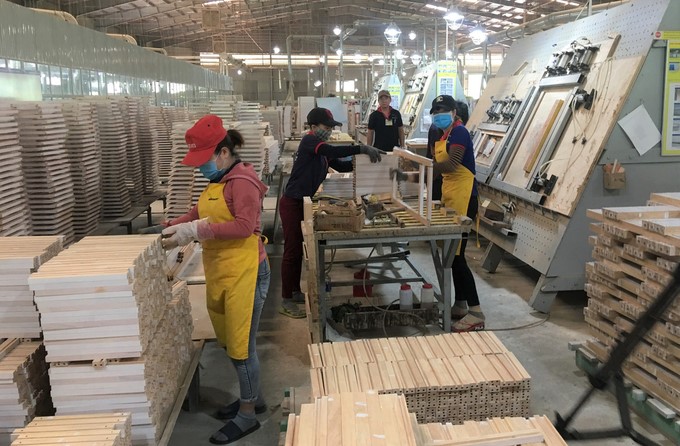
Vietnam's wood industry urgently needs to transform production to reduce GHG emissions. Photo: V.D.T.
According to Mr. Philip Graovac, Deputy Country Representative of the Asia Foundation in Vietnam, Vietnam is a timber exporting country, so it will definitely benefit from the green transformation. Green transformation helps Vietnamese wood enterprises maintain and increase the competitiveness of their wood products in the international market. In addition, after their successful transformation, enterprises have a great opportunity to gradually participate in the carbon market via the supply of carbon credits, thereby increasing their income because the need for carbon credits in the world is getting bigger and bigger.
"If actively "greening", Vietnamese wood enterprises will have more opportunities in foreign markets that have strict requirements. When preparing early, businesses will understand the necessary actions to improve economic efficiency in the process of participating in the carbon credit trading market", said Mr. Philip Graovac, Deputy Country Representative of the Asia Foundation in Vietnam.
According to Dr. To Xuan Phuc, Director of Trade Policy and Resource Management Program at Forest Trends Organization (USA), carbon credits operate on two market mechanisms: voluntary carbon market and compulsory carbon market. Wood enterprises in Vietnam that want to participate in the voluntary carbon market must know their level of emissions. The Vietnamese government will soon issue detailed regulations.
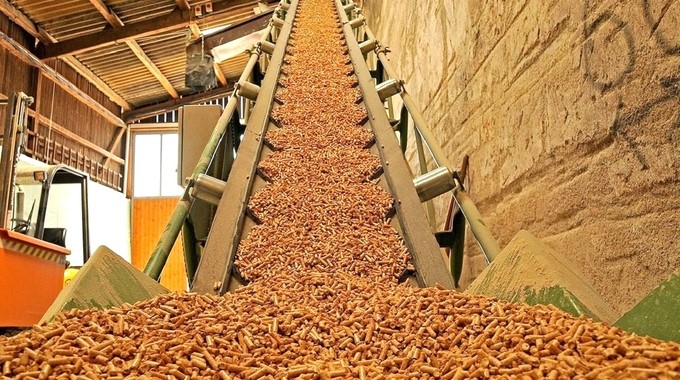
Each processing industry in Vietnam's wood industry will be subjected to the government’s allowed level of GHG emissions; if exceeding that level, it is mandatory to buy carbon credits. Photo: V.D.T.
Wood enterprises can sell carbon credits in the domestic market if their emissions are lower than the government's regulated level. Enterprises with carbon emissions in excess of the regulated level will have to buy back from businesses with low emissions to meet regulatory requirements. Therefore, each enterprise is required to inventory its emissions.
"In order to access information early, enterprises need to actively connect with state agencies in charge of inventorying greenhouse effects, such as the Department of Industry and Trade at the local level. In green transformation, enterprises are required to change management methods and use tools and materials that are more environmentally friendly. Enterprises need to go through two channels, including departments and branches, to find out how the Government requests transformation and consult what enterprises' foreign partners are implementing to meet the standards of their countries to follow," said Dr. To Xuan Phuc.
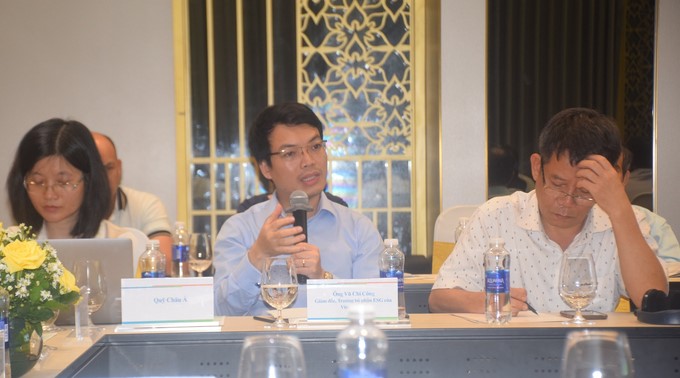
Mr. Vu Chi Cong, Senior Manager of Vinacapital’s Environment, Social, and Governance (middle), explains about carbon credits for wood enterprises. Photo: V.D.T.
According to Mr. Vu Chi Cong, Senior Manager of Vinacapital’s Environment, Social, and Governance, it is mandatory for Vietnamese enterprises to implement green transformation because that is the requirement of investors, customers, and the trend of the times, and at the same enterprises can enjoy great benefits from carbon credits. Enterprises with full conditions for green transformation can meet the requirements of buyers and investors. Pioneer enterprises in green transformation will have more opportunities and earlier access to international capital.
"Vietnamese wood enterprises should implement a green transformation method, starting with changing the leadership’s perception and setting up a specialized department in green transformation to update the requirements of partners. Enterprises owning a lot of carbon credits will have many opportunities for sustainable development," said Mr. Vu Chi Cong.
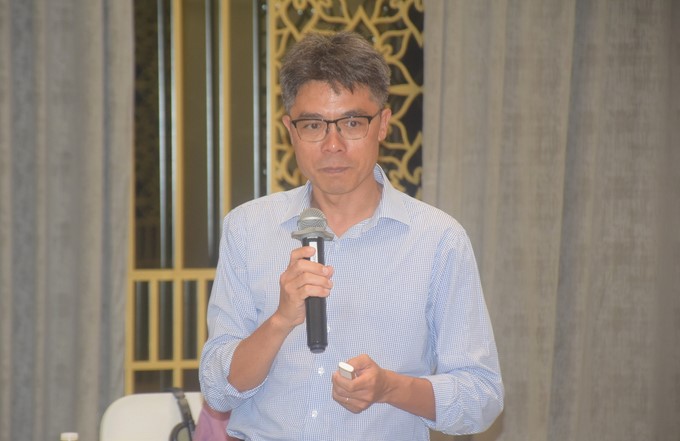
Dr. To Xuan Phuc, Director of the Trade Policy and Resource Management Program at Forest Trends Organization (USA), explains how carbon credits work. Photo: V.D.T.
On January 7, 2022, the Government issued Decree 06/2022/ND-CP regulating the mitigation of greenhouse gas emissions and the protection of the ozone layer. Accordingly, in 2025, Vietnam will establish and organize a pilot operation of a carbon credit exchange. By the end of 2027, regulations for carbon credit management and the exchange of GHG emission quotas and carbon credits, and a regulation on the operation of a carbon credit exchange will be developed. In 2028, Vietnam will organize the operation of a carbon credit exchange, regulating activities to connect and exchange domestic carbon credits with regional and global carbon markets.
Translated by Huyen Vu Thu

(VAN) Dr. Le Van Nguyen, Director of the Institute of E-Commerce Management (ECM), emphasizes the potential for green development through the cultivation of fruit trees, particularly in provinces such as Son La.

(VAN) VAAS and numerous Vietnamese enterprises have signed cooperation agreements with Japanese partners to promote agricultural technology and trade connectivity.
/2025/05/29/5625-12-214801_567.jpg)
(VAN) Provincial mergers in the Mekong Delta promise to streamline administration, expand inter-provincial raw material areas, and foster close linkages in agricultural value chains, benefiting both businesses and cooperatives.

(VAN) Merging Mekong Delta provinces contributes to the expansion of agricultural raw material areas, addressing previous constraints caused by provincial boundaries. Additionally, this expansion will reduce costs and strengthen linkages between businesses, cooperatives, and farmers.
/2025/05/29/1043-2-153730_145.jpg)
(VAN) The Government's policy to merge provincial-level administrative units opens up major opportunities for the Mekong Delta region to reshape its agricultural development strategy toward large-scale production, effective regional linkages, and sustainability.

(VAN) The mutual export of agrifood products between the European Union (EU) and the United Kingdom (UK) must occur again without certification, border controls or other red tape. This was agreed at the UK-EU summit.
/2025/05/22/5121-2-173645_677.jpg)
(VAN) NBSAP Tracker identifies strengths and areas for improvement in the National Biodiversity Strategy, based on each region’s priorities and capacities.